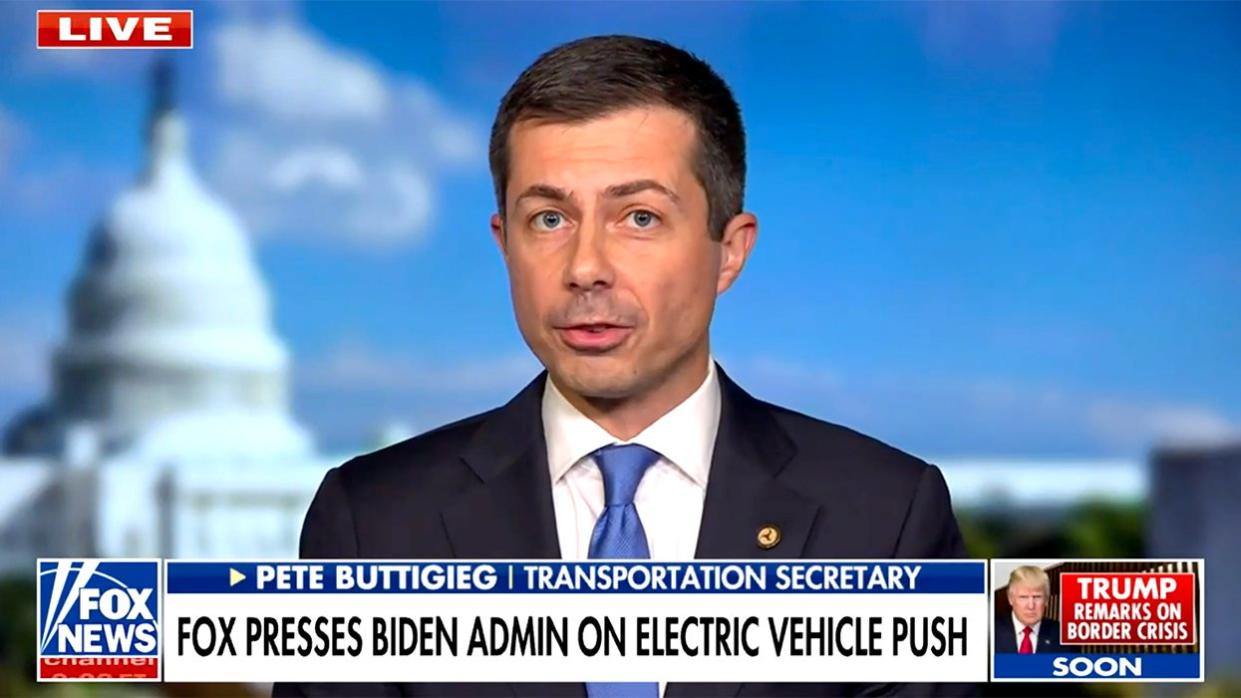Pete Buttigieg explains to Fox News viewers how electric vehicle opposition is like cell phones and landlines

In a conversation on Fox News Tuesday, U.S. Transportation Secretary Pete Buttigieg articulated a firm defense of the Biden administration’s electric vehicle push amid significant challenges in the EV industry and skepticism from Republicans. This lack of support often aligns with views that the promotion of EVs forms part of a liberal agenda aimed at tackling climate change, a concept met with apprehension by some conservatives.
Addressing the auto industry’s recent difficulties, including notable job cuts at Ford’s F-150 Lightning plant, Buttigieg highlighted the unwavering consumer demand for EVs, stressing the automotive sector’s inevitable evolution towards electric mobility. “Consumers have wanted and purchased more EVs every single year than the year before,” Buttigieg said.
The conversation unfolded against industry challenges highlighted by unfavorable business developments. CNBC detailed Tesla’s significant first-quarter stock plunge and the broader concerns over auto sales as the company grapples with heightened competition and disruptions. Tesla’s shares plummeted 29 percent in the first quarter, marking a critical period for the EV giant amid Wall Street’s growing apprehension.
— (@)
Fortune reported Ford’s decision to slash two-thirds of its workforce at the F-150 Lightning plant in Dearborn, Mich., as the automaker recalibrates its ambitious electric car plans due to sales falling short of projections. Despite these setbacks, Ford’s commitment to its Model E E.V. line remains strong, with the compny emphasizing its ranking as the second-best-selling EV brand in the U.S. and its ongoing efforts to expand EV and battery production capabilities.
Buttigieg likened the current resistance to electric vehicles to the early-2000s skepticism toward replacing landlines with cell phones, suggesting an inherent resistance to technological advancement. “Sometimes when these debates happen, I feel like it’s the early 2000s, and I’m talking to some people who think that we can just have landline phones forever,” he remarked, advocating for an embrace of the future of transportation.
Tesla’s position as an industry leader is challenged by intensifying competition from China, as detailed by CNBC, where companies have launched new models at competitive prices. Tesla’s operations in Europe have also faced disruptions from environmental protests and labor strikes.
Buttigieg stressed the strategic importance of the U.S. leading in the EV market to prevent falling behind global competitors, notably China. He argued that the transition to electric vehicles is not merely about adhering to environmental standards but about securing economic and technological leadership on the world stage.
As the industry encounters headwinds, from workforce adjustments at Ford to competitive pressures on Tesla, Buttigieg’s overarching message emphasized adaptability and forward-thinking. “The reality is that the automotive sector is moving toward EVs, and the U.S. can either fall behind China, or we can claim the lead,” Buttigieg said.

